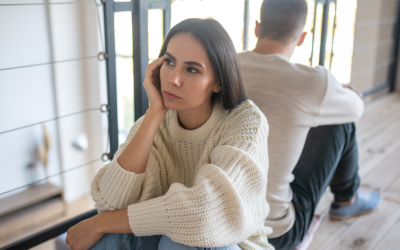
What Causes Relationship Anxiety? Helpful Insights and Examples
Written by Shebna N. Osanmoh, PMHNP-BC
This post may contain affiliate links, which means we may receive a commission, at no extra cost to you, if you make a purchase through a link. Please see our full disclosure https://sagecounselingtherapyandwellness.com/disclosure-privacy-policy-terms-of-use/ for further information.
Relationship anxiety is a multifaceted phenomenon that can be triggered by a variety of experiences and underlying issues with your partner from your everyday life. The causes of relationship anxiety are often formed in early developmental experiences, past relationship trauma, and ingrained cognitive patterns.
What is Relationship Anxiety?
Relationship anxiety is a state of mind that consists of overthinking, fear, or insecurity about a romantic relationship. It typically grows from your past relationships, low self-esteem, attachment issues, or fears about abandonment. Many people feel the effects of relationship anxiety when they are about to jump into a new relationship. But remember, it also affects people who are in long-term relationships and have had previous trauma in relationships. If you have relationship anxiety, it can lead you to severe emotional distress and affect your interactions with your partner or spouse.
Let us understand the matter through a practical example:
Sarah and Jake’s Relationship Anxiety
Sarah, a 28-year-old graphic designer, has been dating Jake for six months. They have a great connection, share common interests, and enjoy each other’s company. However, Sarah often finds herself feeling anxious about the relationship, even when things are going well.
Whenever Jake takes longer than usual to respond to her texts, Sarah starts overanalyzing. “Is he losing interest? Did I say something wrong? What if he’s getting bored of me?” These thoughts spiral, making her feel restless and on edge.
One evening, Jake tells Sarah that he won’t be available on the phone that night. He wants to chill with friends and plan a gaming night to play online multiplayer games. It was a long-due event—and he can’t postpone it anyway. Even though Sarah logically knows it’s healthy for him to have some alone time with his friends, she can’t shake the feeling that he might be pulling away. Her heart races, and she starts scrolling through their past conversations, looking for any signs that he might be losing interest.
Instead of communicating her feelings openly, Sarah withdraws and acts distant the next time they talk. She gives short responses and avoids eye contact, hoping Jake will notice and reassure her. When he asks if something is wrong, she brushes it off, saying, “Nothing, I’m fine.” But inside, she’s worried: What if he stops loving me?
(**Disclaimer: This case study is fabricated for educational purposes, and bears no resemblance with any living person, knowingly or unknowingly!)
This pattern of overanalyzing, seeking reassurance, fearing abandonment, and struggling to communicate openly is a common presentation of relationship anxiety. If you face something similar, don’t leave it unaddressed. It can create tension and misunderstandings between you and your partner and ruin a healthy relationship.
What Are The Probable Causes of Relationship Anxiety?
There are several causes that trigger relationship anxiety:
1. Insecure Attachment Styles
Early Childhood Experiences. Our earliest relationships, especially with primary caregivers, shape our expectations about intimacy and trust. Kids who experience inconsistent caregiving or emotional unavailability may develop an anxious attachment style. This style is characterized by a heightened sensitivity to signs of rejection or abandonment. This sensitivity gradually leads to chronic anxiety in relationships.
Attachment Theory. People with anxious attachments tend to overanalyze their partner’s behavior. As a result—they often interpret normal actions as signals of impending rejection.
2. Past Relationship Trauma
Abandonment and Betrayal. If you had negative experiences in your previous relationships—such as infidelity, betrayal, or abandonment—you may have severe emotional scars. These negative experiences can trigger intense fears and anxiety in subsequent relationships.
Emotional Wounds. If you faced an aggressive partner in your past relationship and received abusive behaviors on emotional, physical, or psychological grounds, it may put a deep-rooted fear in your mind. As a result, you’ll become mentally vulnerable and find it difficult to trust a new partner.
3. Low Self-Esteem and Negative Self-Perception
Self-Doubt. When a person has a poor self-image or low self-esteem, they may believe that they are not worthy of love. The person also believes that their partner will eventually find out all of their flaws. This can lead to a constant need for mental support.
Cognitive Distortions. People may also experience negative thought patterns such as catastrophizing (expecting the worst outcome) and personalization (blaming oneself for relationship issues) which triggers relationship anxiety.
4. Communication Challenges and Misinterpretations
Poor Communication Skills. Misunderstandings and lack of clear communication can increase relationship issues. When you become unable or unwilling to communicate with your partner, you can’t fully express your feelings and emotions. As a result, suppressed emotions boost your anxiety to a different level.
Overinterpretation. If you are too anxious about your relationship, you might find difficulties reading your partner’s body language. Whether you didn’t understand the cues or mostly read into them too much, you may be misinterpreting your partner’s feelings or intentions.
5. Societal and Cultural Influences
Social Media and Comparison. In today’s digital age, constantly comparing your relationship with other people’s on social media can create unrealistic expectations. This comparison often increases your insecurities.
Cultural Narratives. You might find a lot of relationship advice on social media that sounds like this – “This is how a great relationship looks!” Viewing these social media posts may put pressure on couples and make them anxious once they identify their relationship chemistry is not as “good” as these examples.
6. Underlying Mental Health Conditions
General Anxiety Disorders. Relationship anxiety can also be triggered due to more severe anxiety issues. For a few couples, generalized anxiety disorder (GAD) or social anxiety may boost their anxiety levels regarding personal relationships.
Co-occurring Depression. If you are suffering from depression and feel worthlessness or despair, it may trigger relationship anxiety. When you are in a relationship, you might share your feelings with your partner. So, there might be a possibility that you may transfer your negative self-beliefs onto your partner.
Quick Tips for Relationship Anxiety
If you’re experiencing relationship anxiety, here are three quick methods to help ease your worries in the moment:
1. Ground Yourself with Deep Breathing
Try the 4-7-8 breathing technique. Inhale for 4 seconds, hold for 7, and exhale for 8. This helps calm your nervous system and reduce overthinking.
2. Challenge Negative Thoughts
Whenever you feel worried, ask yourself – “Is this fear real or just triggered by your assumptions?”
If you are getting confused, just write down your anxious thoughts and find out if there are any logical reasons behind them. Don’t get worried until you find out any evidence, and trust in your relationship.
3. Engage in a Mindful Distraction
Shift focus by going for a short walk, listening to music, or practicing gratitude. Engaging in another activity helps break the cycle of anxious rumination.
To discuss how therapy could help you during this season of your life, please contact me or schedule your free 15-minute consultation.
Want to read more? Here are a few of my related blog posts you may be interested in checking out!
Author Bio:
Shebna N. Osanmoh, PMHNP-BC, is a board-certified psychiatric mental health nurse practitioner associated with Savant Care, Los Altos, CA, mental health clinic. He has extensive experience and a Master’s from Walden University. He provides compassionate, holistic care for diverse mental health conditions.





0 Comments